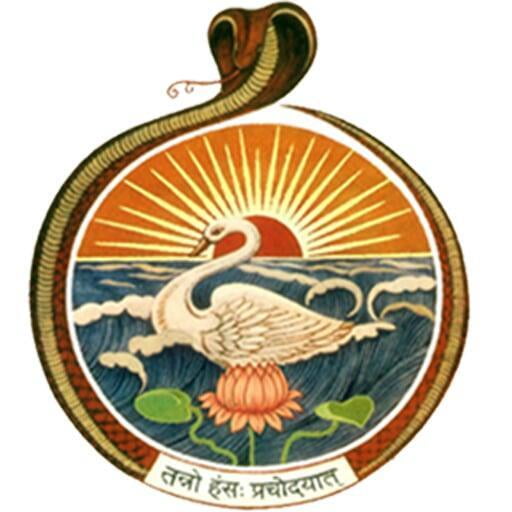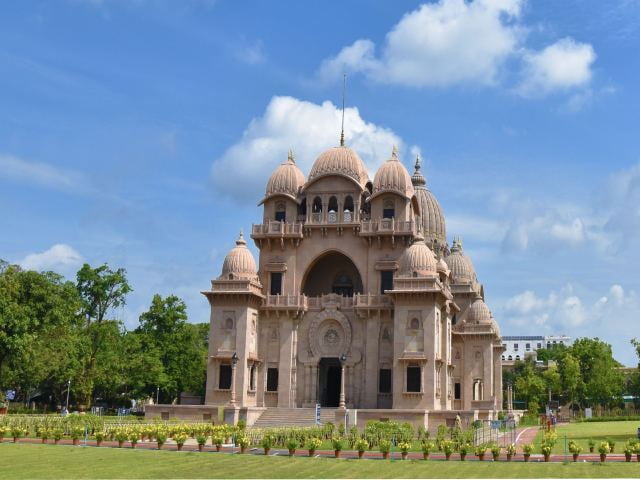Ramakrishna Math & Ramakrishna Mission
Ramakrishna Math & Ramakrishna Mission
Ramakrishna Math and Ramakrishna Mission are worldwide, non-political, non-sectarian spiritual organizations which have been engaged in various forms of humanitarian, social service activities for more than a century. Inspired by the ideals of renunciation and service, the monks and lay devotees of the Math and Mission serve millions of men, women and children, without any distinction of caste, religion or race, because they see the living God in them.
Our Emblem
The common emblem of the Ramakrishna Math and Ramakrishna Mission is a symbolic representation of their ideology. It was conceived and sketched by Swami Vivekananda himself. The meaning behind this emblem, in the language of Vivekananda himself:
“The wavy waters in the picture are symbolic of Karma, the lotus of Bhakti, and the rising-sun of Jnana. The encircling serpent is indicative of Yoga and awakened Kundalini Shakti, while the swan in the picture stands for Paramatman. Therefore, the idea of the picture is that by the union of Karma, Jnana, Bhakti and Yoga, the vision of the Paramatman is obtained.”
This symbol is the epitome of Swamiji’s message of harmony and synthesis, leading to life’s fulfilment.

- God realization is the ultimate goal of human life as that alone can bring man supreme happiness and peace.
- God is one, and is known by different names in different religions and sects.
- God can be realized through various paths taught in world religions.
- All religions are true in so far as they lead to the realization of the Ultimate Truth.
- God dwells in all people and so everyone, without the distinction of caste, creed or race, should be treated with respect and served with love.
Sri Ramakrishna’s main teachings are:
Some teachings of Sri Ramakrishna:
On God and His Existence: “You see many stars at night in the sky, but find them not when the sun rises; can you say that there are no stars in the heaven of day? So, O man, because you do not behold God in the days of your ignorance, say not that there is no God”.
- On God’s nature: “It is the nature of the lamp to give light. With its help some may cook food, some may forge deeds, and some may read the Bhagavata (scriptures). Is it the fault of the light? So, is it the fault of God that some try to attain salvation with the help of His holy name, while others use His name for success in attempted theft?
- On Egotism: “…the idea of self is the Maya of the soul. It is our egotism that shuts out the light. When this ‘I’ is gone, all difficulty will have vanished. If by God’s grace the thought that ‘I am not the doer’ is firmly established in the heart, a man becomes free even in this life. For him there is no more fear.”
- Advice to the worldly-minded: “If you desire to live in the world unattached, you should first practice devotion in solitude for some time – say a year, or six months, or a month, or at least twelve days. During this period of retirement you should meditate constantly upon God, and pray to Him for Divine Love; you should revolve in your mind the thought that there is nothing in the world that you may call your own – that those whom you think your own will pass away in no time. God is really your own. He is your All in All. How to obtain Him should be your only concern.”
- On how to harmonize the world and God: “As a man standing on the brink of a deep well is always watchful and afraid lest he should fall into it, so should a man living in the world be always on his guard against temptation. He who has once fallen into that well can hardly come out of it pure and stainless”.
- On how to perform one’s duties: “As a maid in a rich family brings up the child of her master, loving the baby as if it were her own, yet knowing well that she has no claim upon it; so also should you think that you are but trustees and guardians of your children, whose real father is the Lord Himself”.
- On the practice of non-attachment: “The maid-servant says with reference to the master’s house, ‘This is our house’. All the while she knows that the house is not her own, for hers is far away in some distant village of Burdwan or Nadia. Her own thoughts are all sent forth to her village home.
Again referring to her master’s child in her arms she will say ‘My Hari (that being the name of the child) has grown very naughty’ or, ‘My Hari likes to eat this or that’ and so on. But all the while she knows certainly that this Hari is not her own. I tell those, that come to me, to lead a life unattached like this maid-servant. I tell them to live unattached to this world – to be in the world, but not of it- and at the same time to keep their minds directed to God – the heavenly Home from where all come. I tell them thus to pray for Bhakti, and found their lives on it”. - On spiritual practice: “The human mind is like a pack of mustard seeds. As it is very difficult to gather the seeds that escape out of a torn package and are scattered in all directions, so when the human mind runs in diverse directions and is occupied with many worldly things, it is not a very easy task to collect and concentrate it. The mind of a youth, not running in diverse directions, can be easily fixed on anything, but the mind of an old man being totally occupied with worldly things, it is very hard for him to draw it away from them and fix it on God”.
Books/References on Sri Ramakrishna:
- Life of Sri Ramakrishna (Foreword By M. Gandhi) – Chennai Math
- A Short Life of Sri Ramakrishna – By Swami Tejasananda – Advaita Ashrama
- The Gospel of Sri Ramakrishna – Chennai Math | Online edition | amazon.com

